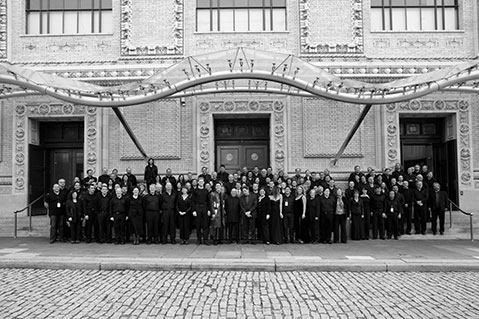Dennis Russell Davies: An American in Austria
Conductor Comes to S.B. with His Linz-Based Orchestra

As an American native who lives and works in Europe, Dennis Russell Davies has gotten used to being asked to explain puzzling aspects of American politics. His response is to politely decline. “I have Austrian citizenship and American citizenship both,” he said. “I tell them, ‘Let’s take care of our own issues.’”
But the internationally renowned maestro, who will lead Bruckner Orchestra Linz in a concert Tuesday night at the Granada Theatre, has his political opinions. He noted that he touched down at Kennedy airport outside New York City on a Saturday afternoon, just a few hours before demonstrators began gathering to protest the Trump administration’s new edict regarding immigration. “It’s difficult to look at,” Davies said of the controversial, and now partially withdrawn, proposal. “But I was very pleased that our federal judges are behaving in an independent and focused way. That’s very good. I also think [the election results are] causing a lot of people to really take stock and think about why there are so many alienated and disaffected people. These aren’t bad people; they’re people who feel forgotten and neglected.”
That combination of thoughtfulness and empathy has propelled Davies, 72, to the top ranks of orchestral conductors. The native of Toledo, Ohio, is currently in his 15th and final season with Bruckner Orchestra Linz, which has been the state orchestra of upper Austria for more than 200 years.
The ensemble was renamed for the great late-19th-century composer exactly a half century ago. But the connection goes far beyond the moniker. Davies noted in a telephone interview that the orchestra plays regularly in St. Florian, which is the cathedral just outside Linz where Bruckner lived, performed, and is buried.
The first time you played Bruckner’s music in that space, did you find it intimidating? I don’t know if it was intimidating, but it was certainly inspiring. When you perform in that space, you learn a lot about how to perform his music. There are several things about his music where, the first time you confront it, you aren’t quite sure how to deal with it. There are abrupt stops to the music, and fermatas [indications that a note should be prolonged] that come in the middle of a movement. When you play it in the acoustic of that cathedral, you realized he inserted them because the space [demands it]. Having played it there also has a big effect on the tempos that you choose. It’s all about how you can make the music understandable in the space for which it was written.
You’re not playing Bruckner on this tour, but you are playing a meaty program of Schumann, Richard Strauss, and Samuel Barber’s Violin Concerto with Robert McDuffie, a regular collaborator of yours. How do you describe his playing? He’s obsessive about music. He takes a piece by the throat and lays it bare for the public. He loves the pieces he’s playing and communicates that to the audience.
Barber is a great American composer, but not one whose music is programmed all that often by American orchestras. Why is that? I’m glad you’re asking the question. More people should. A lot of his works deserve to be played more regularly. When I was younger, his piano sonata and piano concerto were both regularly programmed. It’s a shame our major orchestras don’t play this music.
4·1·1
CAMA presents Bruckner Orchestra Linz, conducted by Dennis Russell Davies, Tuesday, February 7, 8 p.m., at the Granada Theatre (1214 State St.). Call (805) 899-2222 or camasb.org.



